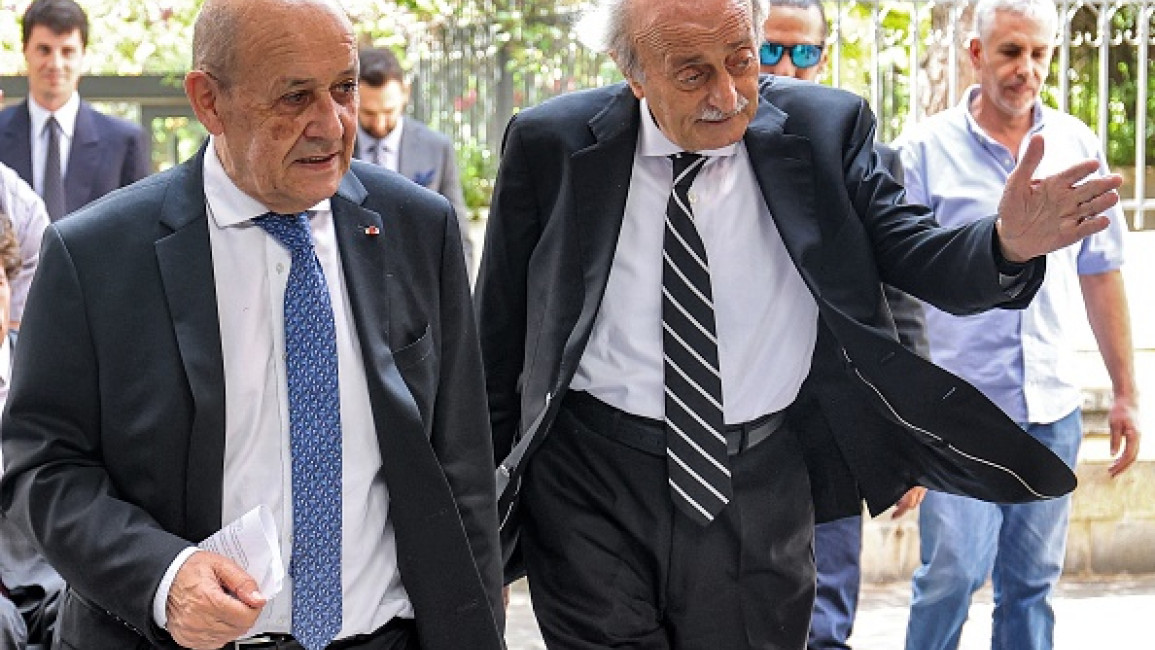Can Lebanon's parties agree on a third presidential candidate?
Lebanon's political parties are considering whether or not to present a third candidate to solve the almost year-long presidential vacancy after France's envoy to Lebanon urged the step on Tuesday.
Lebanon's rival blocs, pro-Iran Hezbollah and its allies on one hand and the anti-Hezbollah opposition backed by Western and Arab Gulf states on the other, have put forth their presidential candidates.
As of yet, neither Hezbollah favourite Sleiman Frangieh nor opposition favourite Jihad Azour have garnered enough votes to win the presidency.
French envoy Jean-Yves Le Drian said after consulting with Lebanon's major political blocs that "neither candidate can prevail."
Le Drian further warned that France and the four other members of the five-nation group – the US, Saudi Arabia, Qatar and Egypt – are considering cutting off aid to Lebanon.
The countries provide much-needed funding to Lebanon's army and in-kind aid to the country, which has been mired in a severe economic crisis since 2019.
The group has further threatened "measures against those who obstruct progress" in economic and political reforms, with sanctions understood to be on the table.
Lebanon's political parties continue to trade blame on who is responsible for the political deadlock, accusing each other of not sincerely engaging in productive dialogue to find a compromise.
'Mexican standoff'
When former Minister of Finance Jihad Azour was proposed as a potential candidate for the presidency, analysts predicted slim chances of his election.
Instead, they said Azour was meant to oppose Hezbollah's preferred pick, Sleiman Frangieh and 'cancel out' his candidacy so that a third compromise candidate could be reached.
Various alternative names have been floated for an alternative pick, particularly the current head of the Lebanese Armed Forces, General Joseph Aoun.
But, more than three months after Azour's appearance, no consensus on a third candidate has been reached.
The anti-Hezbollah bloc has said that Hezbollah is stalling the presidential election by not considering any other candidate besides Frangieh.
"Our patience is running out, the people, the MPs are fed up, everyone is fed up, and it's all due to the March 8 alliance [the Hezbollah bloc]. We should go for a third option," Marc Saad, a Lebanese Forces spokesperson for the largest Christian bloc in parliament, told The New Arab.
The Free Patriotic Movement (FPM), the on-and-off Christian ally of the Hezbollah bloc, said, for its part, it "does not object to a third option" but has its conditions before progress can be made.
"The FPM is the first to demand a name that has nothing to do with alignments and axes and to ask for a paper that shows presidential priorities instead of putting forth a name," Rindala Jabbour, a media coordinator for the FPM, told TNA.
Hezbollah had previously accused supporters of Azour of arguing in bad faith, calling him a "confrontation candidate" rather than a serious contender.
Procedural stumbling blocs
The last round of voting on presidential candidates was held on June 14 and did not result in a clear majority.
In the Lebanese presidential system, subsequent rounds of voting can be held with a lower threshold to achieve a majority if the first poll does not result in a presidential pick.
However, after the first round on June 14, MPs left the chamber, and the session lost quorum.
Since then, all sides have said they are calling for a way out of the deadlock – but accuse the others of stalling, often on procedural grounds.
Nabih Berri, the Speaker of the House aligned with the Hezbollah bloc, has long insisted that parties should come to a consensus on a candidate before further voting goes ahead in the parliament.
Berri recently launched an initiative where MPs convene for seven days of discussion and then engage in an open-ended parliamentary session where rounds would be held until a candidate is picked.
Other parties, such as the Lebanese Forces, disagreed that a candidate should be picked outside of parliament, though they say they agree that an open-ended voting round should be held.
"It's an election; after all, we don't have to announce the candidate before the parliament … This should happen under the roof of the parliament," Saad said.
The international community at the end of its rope
In times of crisis, foreign interlocutors have historically stepped in to help Lebanon resolve its crises, such as in the May 2008 war when Doha convened Lebanon's various factions to forge a new political pact.
Some analysts have suggested that Lebanon's current deadlock would be resolved in a similar way, with a candidate being picked by either Riyadh or Tehran.
However, the international community, particularly the five-nation group, has stated that their mediation efforts are nearly exhausted.
"Most foreign diplomats have concluded that this time the obstacles are internal, that local rivalries rather than a lack of an international modus operandi are preventing the election of a president," Karim Bitar, a professor of international relations at the Univesity of Saint Joseph Lebanon, told TNA.
"The group of five could push towards a consensual figure, and if it's not vetoed by Iran, we would have an international agreement, but apparently, some Lebanese parties are not yet ready to make the necessary concessions," Bitar added.



